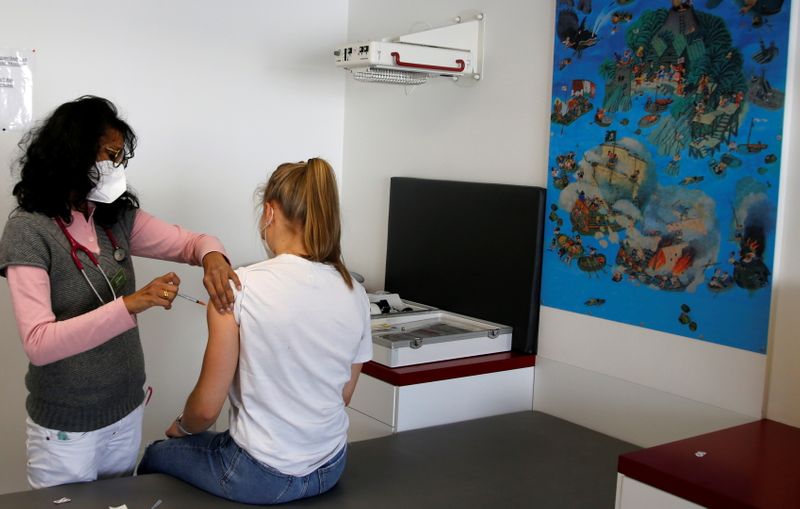BERLIN (Reuters) -Germany plans to make enough COVID-19 vaccine doses available to offer a first shot to children aged 12-16 from June 7, Chancellor Angela Merkel said on Thursday.
After a sluggish start to its vaccination rollout, Germany has increased the pace of inoculations and imposed nationwide lockdown measures which are now being lifted.
With more than 40% of the population of around 83 million having received at least one dose, attention has turned to the question of extending vaccinations to adolescents.
“Every citizen will be offered a vaccination by the end of the summer. This also includes those who are now likely to be included in this vaccination offer, namely 12- to 16-year-old children,” Merkel told a news conference.
“Children and adolescents can then apply for a vaccination appointment after the end of the prioritisation, knowing that the prioritisation will generally be lifted on June 7,” she said after meeting regional leaders for a ‘vaccination summit’.
There are 4.1 million school children in Germany aged 12 years and over, Federal Statistics Office figures show. Opinion on vaccinating them against COVID-19 is divided and the main expert panel on vaccinations has expressed caution.
Some scientists say that, due to a lack of data on long-term effects, it might be better to vaccinate only adolescents with risk factors.
Merkel said parents should not feel pushed into vaccinating their children.
“The important message to all parents is: school does not depend on the question of being vaccinated,” she said. “There should be no indirect coercion for parents. We have no obligation to vaccinate.”
“This impression must not arise, nor the impression ‘I can only go on vacation if I have a vaccinated child’. That would be completely wrong,” she added.
The European Medicines Agency could endorse the Pfizer/BioNTech vaccine for children aged 12 to 15 on Friday.
A document made available before Thursday’s talks said Germany expects to vaccinate about 60% of people in that age group. About 3.18 million doses for each of the first and second vaccination would be needed.
The Robert Koch Institute for infectious diseases reported a 6,313 rise in coronavirus cases in Germany on Thursday, taking the total to more than 3.66 million. The seven-day incidence fell to 41 per 100,000 people, down from around 160 a month ago. The death toll is 87,995 people.
(Reporting by Madeline Chambers and Paul Carrel, Editing by Timothy Heritage and David Gregorio)

























